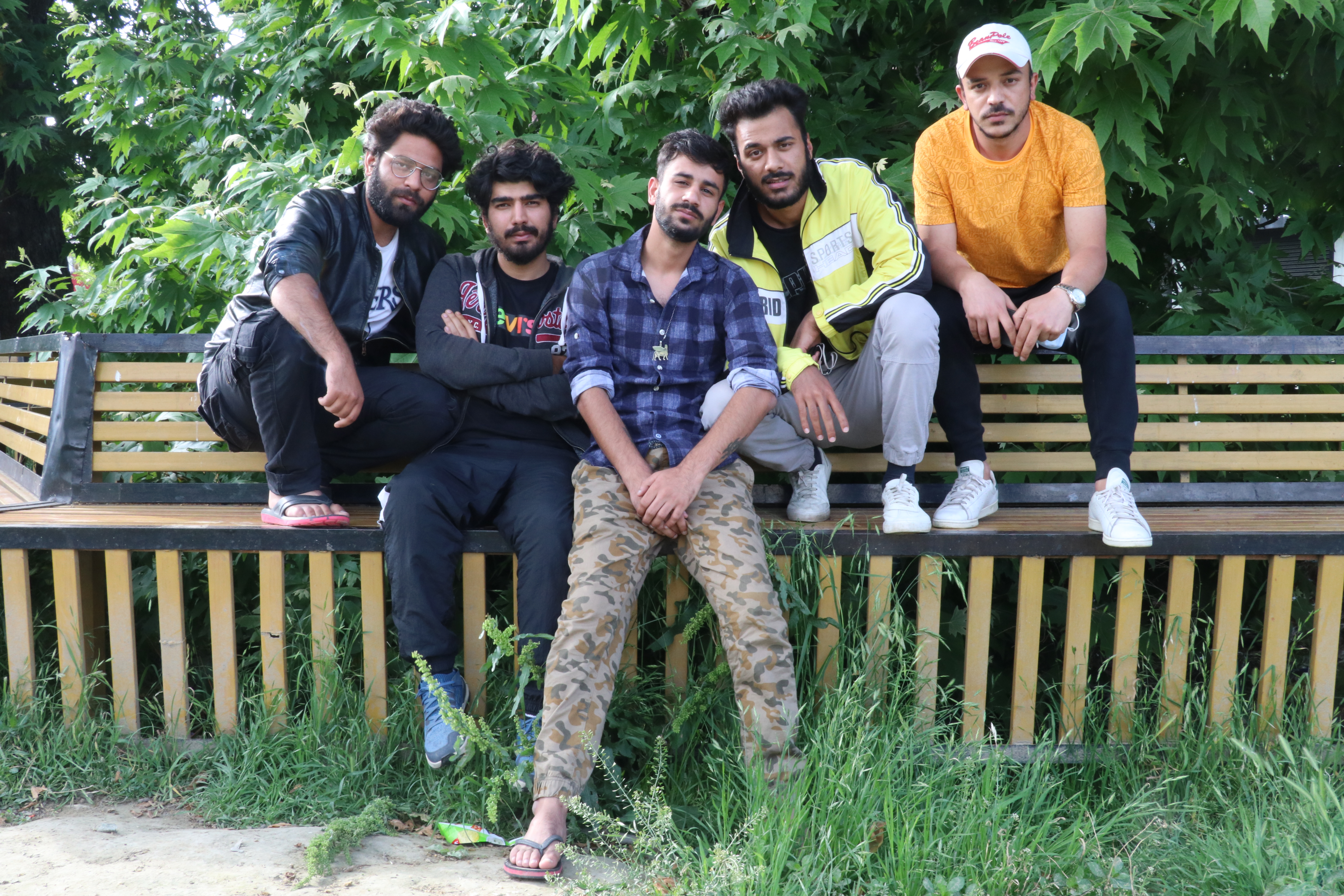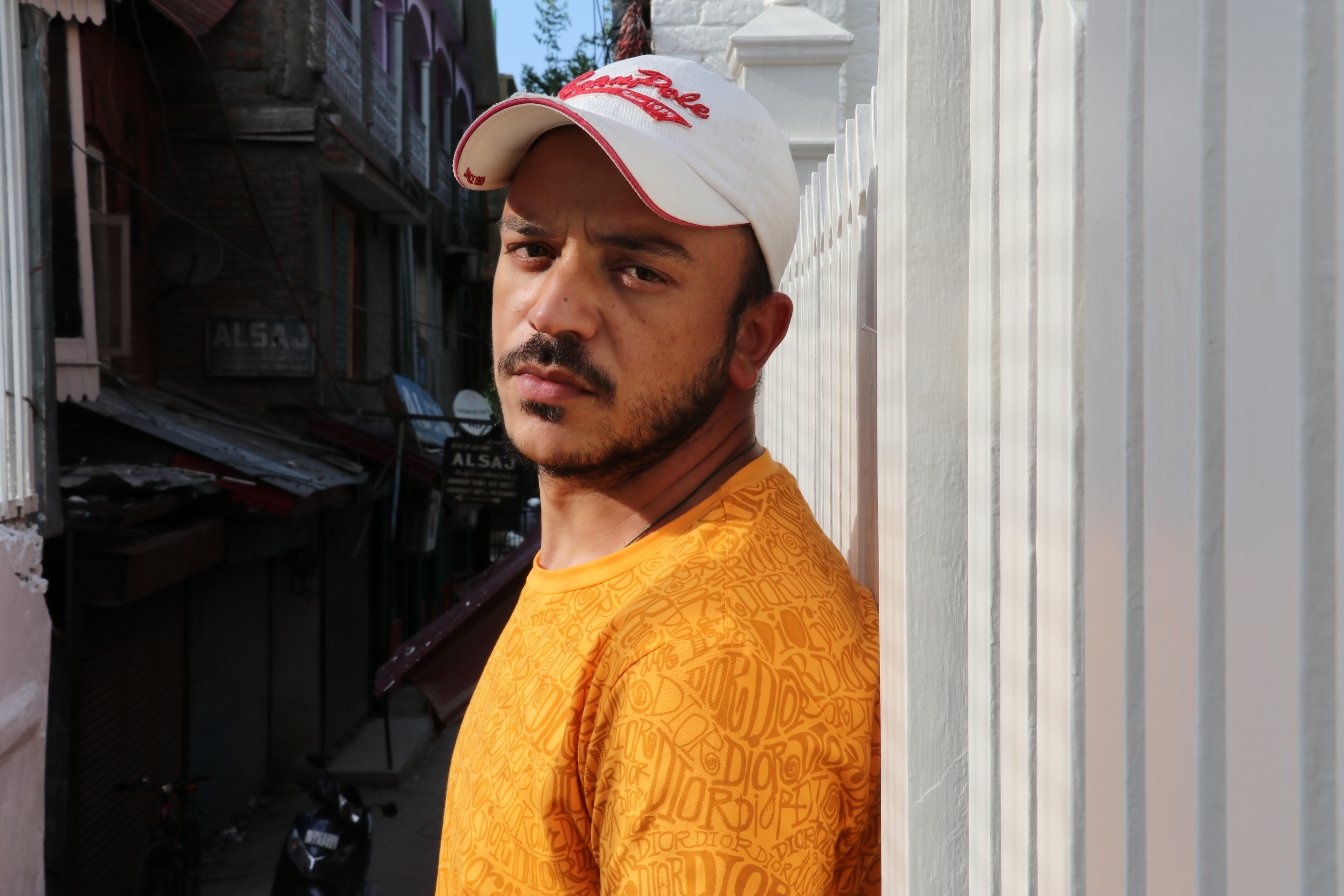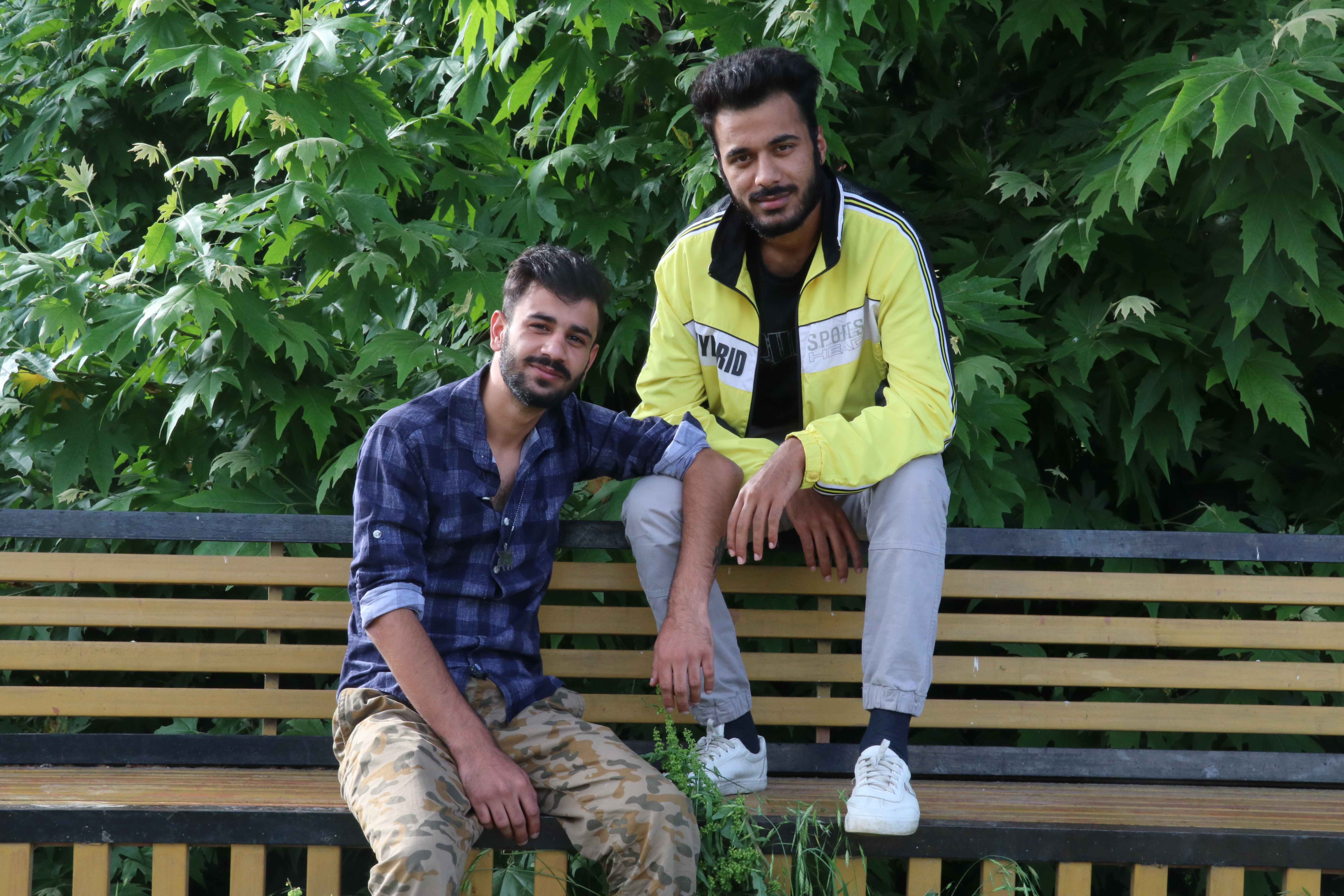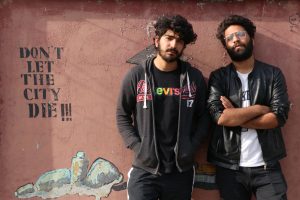They may look like any other group of young men chilling out on a river bank. But these young men in a huddle are scripting the revival of rap music in Indian-administered Kashmir.
The narrow park along the Jhelum River in Srinagar, the summer capital of Indian-administered Kashmir, serves as a meeting place for five young musicians, all aged below 30, as they discuss the finer details to make their songs more attractive before releasing them on streaming platforms like YouTube and Amazon Music.
On a sunny Wednesday afternoon, the discussion was called by a team of two rappers, Tufail Nazir and Syed Arslan, so that they can ask for final comments on their upcoming rap, slated for release this month.
As the duo drops its lyrics, one after another, the fellow artists pay attention to the words until the demonstration is over. The fellow musicians seem delighted with the lines and declare the forthcoming rap from the duo, known as SOS (Straight Outta Srinagar), to be an imminent hit.
“These meetings have now been taking place for one year,” said 26-year-old rapper Ahmer Javaid as we began our conversation. “Our work is getting noticed once again as more and more people are listening to our music with each passing day,” he added after a brief pause.

The group of rappers who spoke to The Diplomat. Left to right: Arif Farooq, Ahmer Javaid, Tufail Nazir, Syed Arslan, and SXR. Picture by Najmus Saqib for The Diplomat.
Rise, Fall, and Replacement
Hip-hop music, including rap, traces its origins to the United States of America, but the genre has made its way to the scenic territory lying in the foothills of Himalayas. Rap emerged in Kashmir following the 2010 uprising triggered by the killing of three people by Indian army in a staged gunfight. People came out on the streets and started anti-India protests. Over hundred unarmed protesters, mostly teenagers, were killed in police and paramilitary retaliation.
To vent his frustration and anger, the then charismatic teenager Roushan Illahi, aka MC Kash, released an English rap I-Protest (Remembrance) for a global audience. The lyrics of the song, “I protest for my brother who is dead / I protest against the bullet in his head. I protest I’ll throw stones and never run / I protest until my freedom has come,” went viral. People passed on the song to their friends, relatives, and acquaintances via Bluetooth or through pen drives. The rap went on to become the anthem for thousands of people who had come out on streets to protest against the continuous civilian killings of that year.
Hip-hop, driven by politics and conflict, challenged India’s claims in Kashmir. The back-to-back hits by MC Kash inspired several youngsters like SXR, Haze Kay, UTB, and Renegade to release their own songs. They too were motivated by the decades-old Kashmir conflict. The rage artists who highlighted the Kashmir conflict earned name and fame for themselves in the world of hip-hop – at least in Kashmir.
The political raps shook the then-government of the disputed territory, claimed by India and Pakistan. To curb the growing narrative — which India calls seditious — Jammu and Kashmir police swung into action, and they started tightening the noose of Kashmiri rap artists.
The rappers continued to produce songs, but the pressure from the Indian government, financial constraints, and a lack of opportunity took a toll. As a result, most of the artists moved to other places to earn their livelihood in some other fields. “People usually believe that Kashmiri rappers did not produce songs after 2013 or 2014 but the reality is that some of the rappers kept on producing music till 2016 and then it disappeared slowly,” Javaid told The Diplomat.
The earlier “conscious rap,” as Javaid put it, was replaced by music produced by newcomers who in a predominantly religious society introduced invective lyrics in their songs. The gangsta-style-rap generated thousands of hits and was mainly consumed by teenagers. “People listened to other hip-hop because I believe they were fed-up with political content and at the same time those songs served as the source of entertainment to them,” he said, adding that people are still consuming such music. But at the same time, they now are looking for conscious rap after a healthy gap.

Mir Gazanfar, aka SXR, made a comeback in the field of hip-hop after coming to believe that newcomers have hijacked the real hip-hop of Kashmir with invective lyrics. Picture by Najmus Saqib for The Diplomat.
Resurrection of “Conscious” Hip-Hop
The silence of “conscious” rap in Kashmir ended in the summer of 2019 when a lesser known rapper, spotted in an imperial-style-beard, featured in the album “Little Kid Big Dreams,” produced by Delhi-based independent record label, Azadi Records.
The album of seven songs portrayed the actual situation in Kashmir and was released shortly after the Bharatiya Janata Party government, led by Prime Minister Narendra Modi, stripped Jammu and Kashmir government of its semi-autonomous status and downgraded the Muslim majority region into two federally-controlled territories on August 5, 2019. “People labeled ‘Little Kid Big Dreams’ as a political rap album, and to be honest I have objections with such tagging. Any song which is driven by reality should be called conscious song,” Javaid said, adding that the word “politics” defames the work of people like him. “One should understand that we are not human rights activists but musicians with zero political affiliation,” he added.
“Elaan,” one of the songs from Little Kid Big Dreams, in which Javaid is seen donning a white prison uniform with a hanging noose tied to his neck, got maximum attention. “When I returned to Kashmir after 5 August (2019) I saw everything was under siege and the very next day I was welcomed by tear-smoke and pepper-gas shells in my neighborhood, and it choked our breath including that of children,” Javaid said. He added that he “penned down the same experience in another song,” “Nazara,” which compared Indian politicians with Nazis.
The success of “Little Kid Big Dreams” inspired several rappers, including 29-year-old Mir Gazanfar aka SXR. The rapper released his multilingual album, “Shalakh.” The set of eight songs starts with an introduction featuring MC Kash: “Straight out of fucking dungeon of living hell / Where rap is just a medium for the stories I tell / High in the mountains the lone survivor runs / Tore the belly of the beast, the native son.”
SXR, who has been producing hip-hop since late 2010, told The Diplomat that hip-hop is evolving ever since “conscious” music returned to Kashmir valley. “I happened to meet Ahmer [Javaid] after a long time through social media in Delhi wherein we discussed the new rap that had hijacked [the] real hip-hop culture of Kashmir,” he said. “We felt the need and it actually forced me to return into this field once again. I started producing fusion songs but still I felt that I was not doing justice with hip-hop as it is an entirely different genre,” he added.
SRX, with the help of Javaid, met many hip-hop artists to learn the tricks of the trade until he decided that he will produce songs in local languages. “Then came the ‘Shalakh’ with 9 tracks varying from heartbreaking to growing up in a war zone,” he said. “Later on all the artists like Tufail and Arsalan, who desired to produce sensible music, came together and that gave birth to the hip-hop community of Kashmir,” he concluded.

Tufail Nazir and Syed Arslan together formed SOS (Straight Outta Srinagar). The young men from the capital city of Indian administered Kashmir have sung many songs together mostly on conflict in the region. Picture by Najmus Saqib for The Diplomat.
Threats and Uncertain Future
Freedom of speech and expression in the Kashmir valley is going through a crisis after the revocation of the former state’s special status. Police officials, as per media reports, in these years have summoned several citizens including journalists for criticizing the government of India on social media or bringing out stories that went against government narrative. Rights activists have condemned the incidents and termed the move as an assault on Article 19 (1A) of the Indian Constitution, which grants freedom of speech and expression.
Rappers say that they feel “insecure and threatened” whenever they produce political content, which is why they try to balance their way of storytelling by talking about other issues as well. “One cannot ignore conflict because we have grown in an abnormal environment,” Nazir of SOS said, adding, “Every conscious rapper is playing smart about politics and conflict seeps into their music.”
Nazir’s partner, Arsalan, interrupted the conversation and told The Diplomat that Kashmiri rappers have a reason to tell their stories unlike the rappers found in Indian mainland. “Our hearts have become heavy because we have seen everything, unlike the rappers from other parts of India,” he said. “My stage name Aatanki is actually borrowed from epithets that I was smothered with by my friends and batch mates during my school life in mainland India. I was called Aatankwadi (terrorist) and Pakistani for telling the truth,” he adds.
Arsalan claimed that a police official, who happened to be his acquaintance, once called his uncle and told him to pass on the message to his nephew that he should “refrain from producing content that touches conflict and politics” after watching one of the songs, “Khoon Rezi.” “Other than this phone call we did not face any threat from anyone,” he said. “I made my uncle understand that it was important to highlight the issues we have been facing and he should be proud of me as I was the only person in the family to make people aware about the different situations,” Arsalan added.
Arif Farooq, alias Qafilah, said that conscious Kashmiri rappers do not earn money through the music they produce. “Rappers like me don’t get live gigs because of the nature of our content,” he said. “We may earn a decent amount of money only after monetization of our own streaming channels followed by ample subscribers and genuine downloads,” Qafilah added.
As Qafliah was sharing his opinion, Javaid stopped him, saying that they are not into making money. Music to them is more or less equal to spirituality, Javaid explained. “It is not something we are making money out of it. Once the situation will get back to normal we might get gigs outside Kashmir,” he said. “I got an opportunity from commercial musical firms back when I was not signed with Azadi Records but I did not opt for it because I knew the requirements of their music. My conscience did not allow me,” he concluded.

































